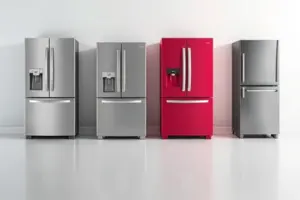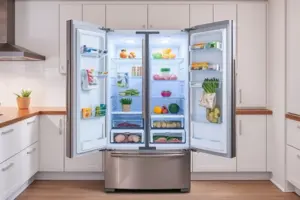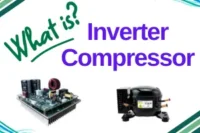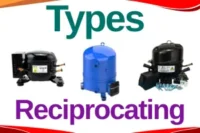What Is an Inverter Refrigerator? Simple Guide to Understanding
Published: 20 Aug 2025
Ali loved drinking cold water at night, but every time he opened the fridge, he noticed it made a loud clicking sound before starting up. He also realized his electricity bill was higher than usual. Curious, he asked a friend why this happened. That’s when he learned what is an inverter refrigerator. Unlike traditional models that turn on and off at full power, an inverter refrigerator runs smoothly at different speeds, saving energy, reducing noise, and keeping food fresh for longer.
Are you ready? Without wasting your time, let’s learn more about it in depth.
Definition of Inverter Refrigerator
An inverter refrigerator is a modern fridge that uses an inverter compressor to adjust its speed based on cooling needs.

Unlike traditional refrigerators that turn on and off at full power, an inverter refrigerator runs continuously at variable speeds. This helps save energy, maintain a stable temperature, reduce noise, and extend the appliance’s lifespan.
Why is an inverter refrigerator important?
It plays a key role in energy efficiency and food preservation. Unlike traditional refrigerators that turn on and off frequently, an inverter refrigerator runs smoothly at variable speeds. This helps reduce electricity consumption, maintain a stable temperature, and extend the lifespan of the compressor. It also operates quietly, making it a great choice for homes, offices, and hospitals.
How does an inverter refrigerator work?
An inverter refrigerator works by using a variable-speed inverter compressor, which adjusts its speed based on cooling needs. The key components include the inverter compressor, temperature sensors, control board, and refrigerant system. Unlike traditional refrigerators, which turn on and off at full power, an inverter refrigerator continuously regulates its speed to maintain a stable temperature.

When cooling demand is high, the compressor speeds up, and when less cooling is needed, it slows down. Temperature sensors detect changes inside the fridge, sending signals to the control board, which adjusts the compressor speed accordingly. This process helps save energy, reduces noise, and ensures consistent cooling for better food preservation.
Types of Inverter Refrigerators
Inverter refrigerators come in various types, each designed for different needs and preferences. Here are all the possible types:

- Single-Door Inverter Refrigerator – A compact and energy-efficient option with a small freezer inside.
- Double-Door Inverter Refrigerator – Features separate fridge and freezer compartments, ideal for families.
- Triple-Door Inverter Refrigerator – Has three compartments, usually with a separate section for vegetables or frozen items.
- Side-by-Side Inverter Refrigerator – Two vertical doors split the fridge and freezer for easy organization.
- French Door Inverter refrigerator – A modern design with two upper doors for the fridge and a lower pull-out freezer.
- Bottom-Freezer Inverter Refrigerator – The freezer is at the bottom, making fresh food more accessible.
- Top-Freezer Inverter Refrigerator – Traditional design with the freezer on top and the fridge below.
- Convertible Inverter Refrigerator – Allows switching between fridge and freezer modes for flexible storage.
- Smart Inverter Refrigerator – Comes with Wi-Fi, app control, and advanced smart features.
- Mini Inverter Refrigerator – A small-sized fridge for offices, dorms, or personal use.
- Glass-Door Inverter Refrigerator – Features a transparent or semi-transparent door for easy visibility.
- Counter-Depth Inverter Refrigerator – Designed to align with kitchen cabinets for a sleek look.
- Built-In Inverter Refrigerator – Custom-fitted into kitchen cabinetry for a seamless appearance.
- Commercial Inverter Refrigerator – Used in stores and restaurants, offering large storage capacity.
- Chest Freezer Inverter Refrigerator – A deep freezer type that runs on inverter technology, ideal for storing frozen food.
These different types cater to various needs, from personal use to large families and commercial purposes.
So guys, if you want a detailed guide on all types of inverter refrigerators, we’ve got you covered! Check out our complete guide and learn everything you need to know. Happy reading!
Applications or Uses of an Inverter Refrigerator
Inverter refrigerators are used in various settings due to their energy efficiency and stable cooling. They help preserve food, medicines, and beverages while reducing electricity costs. Here are some common applications:

- Homes: Keeps food fresh for longer while saving energy.
- Offices: Provides a quiet and efficient cooling solution for staff use.
- Hotels & Restaurants: Ensures proper food storage for cooking and serving.
- Hospitals & Clinics: Stores vaccines, medicines, and medical samples at stable temperatures.
- Retail Stores & Supermarkets: Preserves perishable goods and beverages for customers.
- Labs & Research Centers: Maintains a controlled cooling environment for sensitive samples.
- Pharmacies: Keep temperature-sensitive medicines safe and effective.
- Catering Services: Helps transport and store food efficiently.
- Mobile Food Trucks: Provides cooling in compact spaces with minimal power consumption.
Advantages and Disadvantages of an Inverter Refrigerator
Inverter refrigerators offer many benefits, such as energy efficiency and quiet operation. However, they also have some drawbacks, like higher initial costs. Here’s a quick look at both:
Advantages:
Here, we first look at some of the benefits of an inverter refrigerator.
- Saves energy by running at variable speeds
- Maintains a stable temperature for better food preservation
- Reduces noise due to smooth compressor operation
- Extends compressor lifespan with less wear and tear
- Lowers electricity bills over time
- Offers smart features in advanced models
Disadvantages:
Now, let’s look at some of the cons of inverter refrigerators.
- Higher upfront cost compared to traditional refrigerators
- Requires professional maintenance if issues arise
- Repairs can be more expensive due to advanced technology
- Not all models are compatible with a fluctuating power supply
- Limited availability in some regions compared to standard models
For a more in-depth look at the pros and cons of inverter refrigerators, don’t miss our comprehensive guide! Read it here:Advantages and Disadvantages of Inverter Refrigerators.
Now that you have seen this article from every angle, it is time to share its final result with you. Are you ready? Let’s see in the next section.
Conclusion
So guys, in this article, we’ve covered what is an inverter refrigerator? in detail. Choosing the right fridge depends on your needs, but an inverter refrigerator is always a smart investment. If you want the latest tech, go for a smart inverter refrigerator with Wi-Fi features. If you just need something simple, a bottom-freezer model is a great option. Have you used an inverter fridge before? Share your experience in the comments! Don’t miss out on our other helpful guides for more tips and insights.
FAQs About Inverter Refrigerators
Still have questions about inverter refrigerators? No problem! Here’s a quick list of answers to clear up any doubts you might have and help you decide if it’s the right choice for you.
An inverter refrigerator adjusts its compressor speed based on cooling needs instead of turning on and off like a regular fridge. This helps maintain a steady temperature while using less power. Over time, this reduces electricity bills significantly.
Yes, inverter refrigerators are better in terms of energy savings, quieter operation, and longer lifespan. They keep food fresh for longer by maintaining a stable temperature. However, they do cost more upfront compared to normal refrigerators.
No, it still needs electricity to run, but it consumes less power than traditional models. If there’s a power cut, some models have better cooling retention. Using a voltage stabilizer or backup power can help during long outages.
Top brands like Samsung, LG, Whirlpool, and Haier offer high-quality inverter refrigerators. The best one depends on your budget, size requirements, and the features you need. Always compare models based on energy rating, storage capacity, and extra features before buying.
We hope you liked this article of ours! Now, it’s time to say goodbye. If you found this information useful, feel free to leave a comment and share your feedback. Be sure to explore our other articles for more helpful insights on refrigerators and similar topics!





